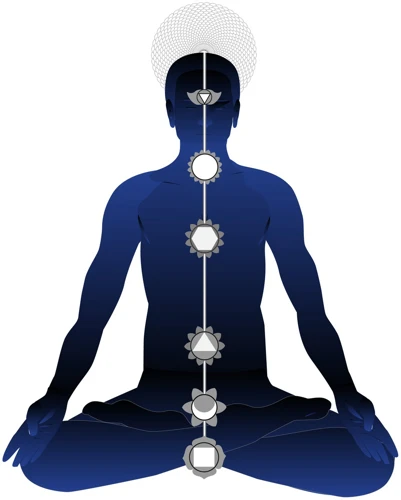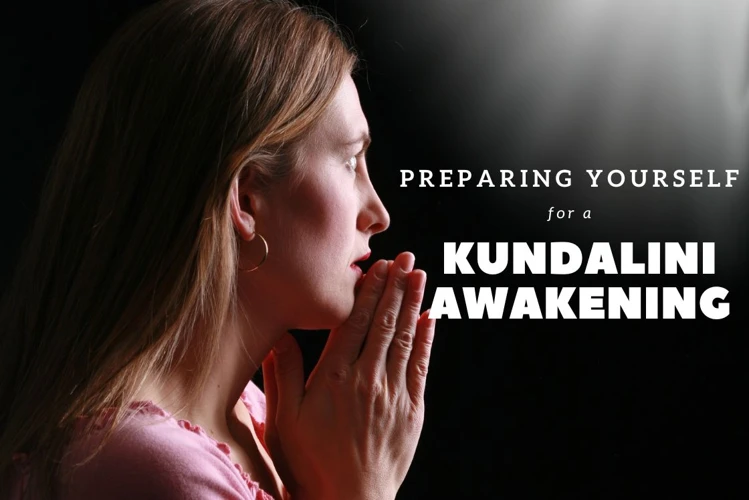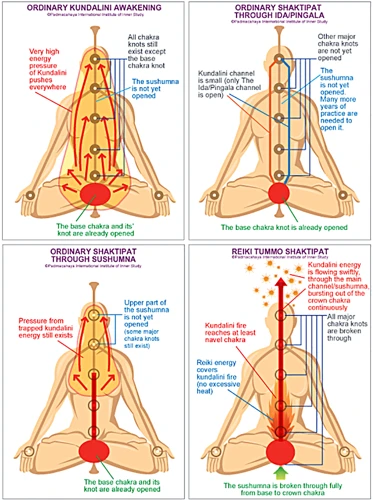Introduction

Entering a state of higher consciousness can be a transformative experience, but it can also come with its fair share of challenges. One such experience is Kundalini Awakening, a process that involves the rise of dormant energy in the body. This powerful release can lead to a range of physical, psychological, and spiritual changes. However, navigating this process safely is crucial to avoid potential difficulties and find balance throughout the journey. In this comprehensive guide, we’ll explore the steps you can take to prepare for and manage the challenges that arise during Kundalini Awakening. From recognizing the symptoms to seeking support, we’ll cover every aspect of this life-changing experience. So, if you’re ready to learn how to navigate the path of Kundalini Awakening, let’s dive in.
What is Kundalini Awakening?
Kundalini awakening refers to when the dormant energy at the base of the spine, known as the Kundalini, is awakened and begins to move upwards through the seven chakras of the body, leading to an intense spiritual experience. This experience can be both exhilarating and challenging, as it brings about significant changes in one’s physical, psychological, and spiritual states. To better understand what Kundalini awakening is, here are some key points to keep in mind:
- The Kundalini energy is often depicted as a coiled serpent at the base of the spine, waiting to be awakened.
- When awakened, the Kundalini energy travels up the spinal column and activates the chakras, leading to a profound shift in consciousness and awareness.
- Some common symptoms associated with Kundalini awakening include physical sensations such as heat or tingling, intense emotional experiences, and heightened states of meditation.
- Kundalini awakening requires careful preparation and guidance, as it can be overwhelming for those who are unprepared.
While Kundalini awakening can offer profound benefits, such as increased self-awareness and spiritual growth, it’s important to approach it with respect and caution to ensure a safe and positive experience.
Why it is important to navigate it safely?
Safely navigating Kundalini Awakening is of utmost importance due to the following reasons:
- Physical Safety: Kundalini Awakening can bring about intense physical sensations and even bodily changes that can be overwhelming and difficult to manage. Without proper safety measures and self-care practices, individuals may be at risk of experiencing physical harm or injury.
- Psychological Well-being: Kundalini Awakening can also activate deeply buried psychological issues and traumatic experiences, which can lead to emotional turmoil and psychological distress. Without appropriate support and guidance, individuals may struggle to cope with these challenges and may even develop mental health issues.
- Spiritual Development: Kundalini Awakening is a profound spiritual experience that can enhance an individual’s spiritual growth and evolution. However, without proper guidance and preparation, individuals may struggle to integrate this experience into their daily lives and may miss out on the transformative potential of Kundalini Awakening.
- Long-term Health: Kundalini Awakening can have long-lasting effects on an individual’s physical, emotional, and spiritual health. It is essential to navigate this experience safely to ensure that these effects are positive and beneficial in the long run.
It is crucial to approach Kundalini Awakening with caution, respect, and a willingness to learn and grow. By doing so, individuals can reap the benefits of this transformative experience while also taking care of their physical, psychological, and spiritual well-being.
Preparing for Kundalini Awakening

Before experiencing Kundalini Awakening, it is crucial to prepare oneself mentally, physically, and spiritually. This process requires dedication and openness to the spiritual journey ahead. It is not something to be taken lightly, as navigating Kundalini energy can be a powerful and overwhelming experience. However, with proper preparation and awareness, one can safely embark on this transformational journey. In this section, we will explore the importance of mental, physical, and spiritual preparation for Kundalini Awakening, and some steps you can take to prepare yourself.
Mental Preparation
Preparing mentally for Kundalini Awakening is an essential element to ensure a safe and positive experience. Here are important mental preparations you need to keep in mind:
- Educate yourself about the Kundalini Awakening process as much as possible. This helps you to recognize the symptoms and understand the changes in your body and mind during the process.
- Set your intentions and goals before the awakening process. Think about what you hope to achieve and your motivations behind the process to help you stay focused and grounded during the journey.
- Be open-minded and accepting of whatever experiences come your way. Keep in mind that the awakening process is unique to each individual, and you may have a different experience than others.
- Cultivate patience and resilience as the awakening process can bring up difficult emotions and physical sensations. It’s important to keep in mind that this is a transformative journey that takes time, so be gentle with yourself and trust your own process.
- Embrace your vulnerabilities as a way to understand yourself better. The awakening process can bring up suppressed emotions and memories, and it’s important to allow yourself to feel them and work through them instead of suppressing them.
- Practice gratitude throughout the awakening process. Recognize the changes happening within yourself and embrace the journey with a positive mindset.
By following these mental preparations, you can cultivate a positive mindset and a sense of inner strength to help you navigate the challenges and transformative experiences of Kundalini Awakening.
Physical Preparation
When preparing for Kundalini Awakening, it’s important to focus on physical preparation as well. This involves taking care of your physical body to ensure that it is strong and able to handle the powerful energy that is Kundalini.
Getting Enough Sleep: One of the most important aspects of physical preparation is ensuring that you are getting enough sleep. Aim for at least 7-8 hours of uninterrupted sleep each night to help your body recharge and maintain optimal health.
Eating a Balanced Diet: Eating a balanced and healthy diet is also important to support physical well-being. Make sure that you are getting enough nutrients, vitamins, and minerals by consuming plenty of fruits, vegetables, lean proteins, and whole grains.
Exercise Regularly: Exercise is another important aspect of physical preparation for Kundalini Awakening. It helps to strengthen your body and build endurance, which can be very beneficial as you begin to experience the powerful energy of Kundalini.
Staying Hydrated: Drinking enough water is crucial to maintaining physical health and handling the intense energy that comes with Kundalini Awakening. Make sure to drink plenty of water throughout the day to stay hydrated.
Avoiding Drugs and Alcohol: It’s important to avoid drugs and alcohol during the preparation process, as they can negatively impact physical health and weaken the body’s ability to handle Kundalini energy.
By taking care of your physical body through sleep, nutrition, exercise, hydration, and avoiding harmful substances, you can help prepare yourself for the intense energy of Kundalini Awakening.
Spiritual Preparation
Spiritual preparation is a crucial aspect to consider when preparing for Kundalini awakening. It goes beyond the physical and mental aspects, as it requires a deeper understanding of the spiritual realm. Below are some important elements of spiritual preparation.
| Element | Description |
| Awareness | It is important to have a general understanding of Kundalini energy and the concept of spiritual awakening. This can include reading spiritual texts, attending workshops or seminars, or seeking guidance from a spiritual teacher or mentor. |
| Intention Setting | Setting intentions for your spiritual journey can help provide a clear direction and purpose. This can be done through journaling, meditation or visualization exercises. |
| Inner Reflection | Self-reflection and introspective practices can help individuals understand their own values, beliefs, and spiritual goals. This can be done through meditation, therapy or engaging in creative activities. |
| Connection to a Higher Power | Developing a relationship with a higher power, whether it be through prayer, meditation or other spiritual practices, can provide a sense of guidance, support and comfort during the Kundalini awakening process. |
| Gratitude Practice | Cultivating a gratitude practice can help individuals maintain a positive mindset and appreciate the small blessings in life amidst the challenges of Kundalini awakening. |
By incorporating spiritual preparation into your journey, you can approach Kundalini awakening with a deeper sense of purpose and understanding, and be better equipped to navigate the challenges that may arise.
Experiencing Kundalini Awakening

As you embark on the journey of Kundalini Awakening, a profound and powerful transformation awaits you. You may experience moments of heightened energy, deep introspection, and spiritual awakening. Your perceptions of reality may shift, and your connection to the universe may deepen. However, this process can also be intense and overwhelming. It’s important to approach it with caution, understanding, and awareness. In this part of the article, we will explore how to experience Kundalini Awakening, recognize its symptoms, understand the process, and manage your experience along the way.
Recognizing the Symptoms
When experiencing a Kundalini awakening, one of the essential things is to recognize the symptoms to understand and manage the experience. Here are some typical symptoms you may experience during a Kundalini awakening.
Physical symptoms:
- Feeling of heat or cold
- Tingling or vibrating sensations
- Sudden jerks or tremors in the body
- Pressure in the head, especially around the third eye area
- Involuntary body movements or stretching
Psychological symptoms:
- Intense emotions, such as fear, anxiety, or euphoria
- Heightened senses, such as vision, hearing, or taste
- Memory flashes or past-life experiences
- Intuition or psychic abilities
- Deep meditation
Spiritual symptoms:
- Feeling connected to a higher power or sense of oneness
- Increased awareness and consciousness
- More profound sense of purpose in life
- Feeling a spiritual awakening or enlightenment
- Healing or transformation of old wounds
It is worth noting that some of these symptoms may simulate symptoms of a physical or mental illness. It is crucial to seek professional medical advice if you’re unsure of your symptoms. By recognizing the symptoms of a Kundalini awakening, you’ll be better equipped to manage and embrace the journey.
Understanding the Process
As Kundalini energy begins to rise, it can activate various energy centers or chakras in the body. This process can be both exhilarating and uncomfortable, as the energy can be quite intense. It’s important to understand that this process is unique to each individual, and can manifest in a variety of ways.
Physical sensations: Many people experience physical sensations during Kundalini awakening. These can include tingling, warmth, or even electrical sensations. Some may also experience involuntary movements, such as shaking or jerking.
Emotional shifts: Kundalini awakening can also bring about intense emotional shifts. It’s common to experience mood swings, sudden bursts of intense joy or sadness, or even a sense of being disconnected from reality.
Heightened spiritual awareness: As Kundalini energy rises, many people report feeling a heightened sense of spiritual awareness. This can manifest as a sense of oneness with the universe, deep inner peace, or a feeling of being connected to a higher power.
Challenges: While Kundalini awakening can be a transformative experience, it can also come with challenges. Some people may experience physical challenges, such as insomnia or changes in appetite. Others may face psychological challenges, such as anxiety or depression. It’s important to be aware of these challenges and seek support if needed.
Integration: As the Kundalini energy continues to rise and the awakening process unfolds, it’s important to integrate the experience into daily life. This may involve making changes to one’s lifestyle, such as adopting a regular meditation practice or engaging in activities that promote balance and relaxation. It can also involve seeking support from friends, family, or professionals to help navigate any challenges that may arise.
Understanding the process of Kundalini awakening is an essential part of safely navigating the experience. By being aware of the potential challenges and taking steps to integrate the awakening process into daily life, individuals can embrace the transformative power of Kundalini energy and develop a deep connection to their inner selves.
Managing the Experience
Managing the experience of Kundalini awakening can be a challenging and overwhelming process for many individuals. It’s crucial to understand how to navigate and manage the experience properly, to ensure that it is an empowering and transformative experience rather than a negative and distressing one. Here are some ways to manage the experience:
| Cultivate Mindfulness | Being mindful and aware of the present moment can help you stay grounded during times of intense Kundalini activity. Practicing mindfulness meditation can be especially helpful in cultivating this skill. |
|---|---|
| Stay Hydrated and Nourished | Providing your body with proper hydration and nutrition is essential during Kundalini awakening. Drinking plenty of water and eating healthy, whole foods can help support your physical and mental well-being. |
| Engage in Self-Care Practices | Activities such as hot baths, massage, and spending time in nature can help nourish and ground you during Kundalini awakening. It’s crucial to prioritize self-care and provide yourself with the time and space you need to heal and recover from any challenges or discomfort that arise. |
| Practice Patience and Compassion | Kundalini awakening is a unique and individual process, and it’s essential to be patient and compassionate with yourself during this time. Learning to trust and surrender to the process and having faith that things will unfold as they should can help minimize stress and anxiety. |
| Seek Support | There’s no shame in seeking out support during Kundalini awakening. Talking to a trusted friend, family member, or therapist can help provide you with the emotional support and guidance that you need. Additionally, working with a spiritual teacher or mentor who has experience with Kundalini awakening can be beneficial. |
By incorporating these management strategies into your Kundalini awakening journey, you can better manage any potential challenges or difficulties that may arise. Remember to prioritize your well-being and be patient with yourself, allowing the process to unfold naturally and at its own pace.
Navigating Challenges

As with any deeply transformative experience, navigating the challenges of Kundalini awakening can be a perplexing journey. The activation of the dormant Kundalini energy can trigger physical, psychological, and spiritual challenges that require self-awareness, self-care, and support from others. Not everyone experiences Kundalini awakening in the same way, but many people face common obstacles along the way. In this section, we will explore some of the challenges that might arise during Kundalini awakening and offer guidance for managing them.
Physical Challenges
As Kundalini Awakening greatly impacts the physical body, it is important to be aware of the potential physical challenges that may arise. Some individuals may experience only mild physical symptoms, while others may experience more intense sensations. Here are some of the physical challenges that one may face during Kundalini Awakening:
- Intense Energy Movements: Energy surges may cause tingling, vibrations, or pulsations in the body. This energy may feel like a rising heat or a strong electrical current.
- Fluctuating Body Temperature: The body’s temperature may change unpredictably, with hot or cold flashes or a feeling of feverishness.
- Sleep Disturbances: Kundalini Awakening may cause insomnia, vivid dreams or nightmares, or intense fatigue, making it difficult to establish a regular sleep routine.
- Physical Discomfort: Some individuals may experience physical pain, discomfort, or stiffness in the back, neck, or other areas of the body.
- Appetite Changes: Kundalini Awakening may cause appetite changes, including loss of appetite or craving for certain foods.
It is important to remember that these physical experiences are a natural part of the Kundalini Awakening process. To manage physical challenges, it is important to establish self-care practices that support the body’s overall health and well-being. This may include regular exercise, healthy eating habits, and sufficient rest. It is also important to seek therapeutic help or medical attention if physical symptoms become overwhelming or interfere with one’s daily life.
Psychological Challenges
Psychological Challenges during Kundalini Awakening
Kundalini Awakening can lead to various psychological challenges that individuals must navigate through in order to safely experience the awakening. Below are some of the possible psychological challenges that can arise during the process.
| Challenge | Symptoms |
|---|---|
| Anxiety | Feelings of intense fear, nervousness, restlessness, and trouble concentrating. |
| Depression | Feeling overwhelmed with negative thoughts and emotions, and feeling hopeless or helpless. |
| Fear | Experiencing intense fear, paranoia or irrational phobias for no apparent reason. |
| Ego Dissolution | Feeling that the self or ego is dissolving, which can be unsettling and may cause fear or panic. |
| Emotional Instability | Rapid mood swings, sudden outbursts of emotions, and intense emotional reactions to various situations. |
| Re-experience of Trauma | Memories and emotions related to past traumas may resurface, causing intense emotions and anxiety. |
| Sensory Overload | Experiencing intense sensory overload such as heightened vision, sound, touch, smell or taste can be overwhelming. |
Managing Psychological Challenges during Kundalini Awakening
It is important to understand that psychological challenges during Kundalini Awakening are common, and not necessarily a cause for concern. However, seeking support and guidance can help individuals manage these challenges safely. Below are some tips for managing psychological challenges during Kundalini Awakening:
- Practicing grounding techniques such as walking in nature, visualization, and deep breathing can help reduce anxiety and emotional stress.
- Mindfulness and meditation practices can help individuals learn how to be present in the moment and manage negative thoughts.
- Working with a therapist or counselor who understands Kundalini Awakening can provide guidance and support in processing emotions and past traumas.
- Practicing self-care habits such as getting enough rest, exercise, and healthy eating can support mental and emotional wellness during the awakening process.
- Reaching out to a trusted spiritual mentor or community can provide a sense of belonging and support during the challenging journey of Kundalini Awakening.
By understanding and managing psychological challenges, individuals can safely navigate through the journey of Kundalini Awakening and experience the benefits of the process.
Spiritual Challenges
During Kundalini awakening, individuals may experience spiritual challenges that can be overwhelming if not properly addressed. These may include:
- Loss of Identity: Kundalini awakening can lead to a profound shift in one’s sense of self, which can be disorienting and unsettling. Individuals may feel like they are losing touch with their previous identity and struggling to find a new sense of purpose.
- Existential Crisis: The intensity of the experience can also prompt individuals to confront some of life’s deep existential questions. This can trigger a crisis of faith or a nihilistic outlook on life.
- Heightened Sensitivity: As one’s spiritual energy is activated, it can lead to an increased sensitivity to environmental and emotional stimuli. This can lead to feelings of overwhelm and difficulty managing daily life.
- Unusual Experiences: Individuals may encounter phenomena that challenge their understanding of reality, such as visions, synchronicities, or heightened intuition. These experiences can be difficult to integrate into one’s everyday life.
To address these spiritual challenges, individuals may need to engage in practices that help them connect with their inner selves and find a new sense of purpose. This may include meditation or mindfulness practices, journaling, or seeking the guidance of a spiritual mentor. It is important to remember that these challenges are a natural part of the Kundalini awakening process, and with the right support and self-care practices, individuals can navigate them safely and emerge with a deeper understanding of themselves and their spiritual path.
Self-Care Practices

As you navigate the challenges of Kundalini awakening, it’s important to prioritize self-care practices. These practices can help you ground yourself and alleviate physical, psychological, and spiritual challenges that may arise during this process. By tuning into your body and seeking out habits that promote overall well-being, you can support a safe and transformative journey. Here are some suggestions for self-care practices:
Meditation
Meditation is an essential self-care practice for those undergoing Kundalini Awakening. Through the practice of meditation, individuals can calm their minds and connect with their inner selves, allowing for a deeper understanding of the awakening process. Here are some helpful tips for incorporating meditation into your routine:
- Find a quiet space: Choose a place where you can sit comfortably without distractions.
- Set a timer: Start with a short period, such as five minutes, and gradually increase the time as it feels comfortable.
- Focus on the breath: Pay attention to the inhale and exhale of your breath, allowing other thoughts to pass by without judgment.
- Repeat a mantra: Choose a word or phrase that resonates with you and repeat it silently or out loud during your meditation.
- Try guided meditation: There are many guided meditation apps and videos available that can be helpful for beginners or individuals who struggle with calming their minds.
Regular meditation practice can help individuals manage symptoms of Kundalini Awakening, such as anxiety or insomnia, and promote a sense of inner peace and grounding. It is important to approach the practice with a non-judgmental attitude and to be patient with oneself as it takes time and dedication to fully reap the benefits.
Yoga and Breathwork
Yoga and breathwork are essential practices that can help you manage the challenges of Kundalini awakening. Incorporating these practices into your daily routine can help you cultivate a sense of peace, balance, and harmony between your mind and body.
Yoga:
- Asanas: Practicing yoga postures, or asanas, can help you enhance your physical flexibility, strength, and balance. This can be especially beneficial during Kundalini awakening, as physical discomfort and tension can be common symptoms.
- Pranayama: Pranayama, or breath control, is an integral part of yoga practice. By regulating your breath, you can calm your mind, reduce anxiety, and improve your overall well-being.
- Kundalini Yoga: Kundalini yoga, specifically designed to awaken your Kundalini energy, can be a powerful practice during the awakening process. However, it’s important to approach it with caution and under the guidance of a qualified instructor.
Breathwork:
- Deep Breathing: Deep breathing, or diaphragmatic breathing, can help you increase the flow of oxygen to your brain and body, reduce stress, and calm your mind. This can be especially helpful during times of emotional or physical distress.
- Alternate Nostril Breathing: Alternate nostril breathing, or Nadi Shodhana, is a simple yet effective technique to balance the left and right hemispheres of your brain, reduce anxiety, and improve concentration.
- Kapalbhati: Kapalbhati, or skull-shining breath, is a vigorous pranayama technique that involves forceful exhalations and passive inhalations. It can help you release toxins from your body, stimulate your digestive system, and energize your mind and body.
Incorporating regular yoga and breathwork practice can help you stay grounded, centered, and balanced during the challenges of Kundalini awakening. However, it’s important to approach these practices mindfully and with the guidance of a qualified instructor, especially during the intense periods of Kundalini awakening.
Grounding Techniques
Grounding techniques are an essential part of self-care during Kundalini awakening. These practices assist individuals in developing a deeper connection to the earth and their physical bodies, which can help them feel more grounded and centered. Here are some grounding techniques to try:
- Earthing: This practice involves walking barefoot on the grass, beach sand or soil, which allows the body to physically connect with the earth. The earth has a negative electrical charge that is believed to balance the positive charge in our bodies. This balance can help reduce inflammation and stress levels.
- Visualizations: This is an effective technique that involves visualizing roots extending from the bottom of the feet, anchoring you to the earth, while also cultivating a sense of stability and security. You can also imagine yourself surrounded by the peaceful and protective energy of the earth.
- Physical activity: Engage in physical activities that keep you connected to the earth, such as gardening, hiking, or even lying down and physically feeling the earth beneath you.
- Breathing exercises: Deep breathing can help calm the nervous system and connect you with the present moment. You can try inhaling deeply through your nose and exhaling through your mouth, focusing on the sensation of the breath moving through your body.
- Mindfulness: Being mindful and present during your everyday activities can help you stay grounded. Pay attention to the feeling of your feet on the ground when walking, the sensation of the water when washing dishes, or the smell of the air when outside.
It is important to note that each person’s experience with grounding techniques will be different, and finding the right approach may take some exploration. However, adding grounding techniques to your self-care routine can be beneficial in balancing your energy and creating a sense of peacefulness during the Kundalini awakening process.
Healthy Lifestyle Habits
Maintaining healthy lifestyle habits is crucial while navigating the challenges of Kundalini Awakening. Here are some habits that can help promote physical, mental and spiritual well-being during this time:
- Adequate sleep: Getting enough sleep is essential as it helps to rejuvenate the body and mind. Aim for 7-9 hours of sleep each night.
- Hydration: Keeping the body hydrated is important for energy, clarity and overall health. Drink at least 8 cups of water each day.
- Proper nutrition: The body needs a balanced diet with plenty of fruits, vegetables, whole grains, and lean protein to function optimally.
- Regular exercise: Exercise helps to release tension, increases blood flow, and promotes overall well-being. Engage in activities that you enjoy- walking, running, swimming, dancing, or yoga.
- Minimizing substance use: Substance use, including alcohol and drugs, can interfere with the Kundalini Awakening process and may lead to physical, psychological and spiritual imbalances. Avoid or minimize the use of such substances.
- Stress management: Stress may obstruct your ability to process the Kundalini Awakening. Try incorporating stress-reducing techniques, such as meditation, into your daily routine.
Remember, the body, mind and spirit are all interconnected, and practicing healthy lifestyle habits help support overall well-being during the Kundalini Awakening journey.
Seeking Support
As we navigate the intense and transformative experience of Kundalini awakening, it’s important to recognize that we don’t have to go through it alone. Seeking support can be a crucial component in managing the challenges and maximizing the benefits of this powerful energy awakening. Whether it’s therapeutic help, spiritual mentorship, or community support, there are various options available for those who are seeking guidance and assistance. In this section, we’ll explore some ways to seek and find the support that can help us on this complex journey.
Therapeutic Help
When navigating the challenges of a Kundalini Awakening, seeking therapeutic help can be a crucial step towards balance and healing. Some therapeutic options to consider include:
- Talk Therapy: A licensed therapist can help you work through any psychological challenges that may arise during your Kundalini Awakening. They can provide a safe and supportive space for you to explore your emotions and thoughts, and offer practical coping strategies for managing any disruptive symptoms.
- Bodywork: Massage therapy or chiropractic care may help alleviate any physical discomfort that may be present during your Kundalini Awakening. These modalities can help promote relaxation and release tension in the body.
- Energy Healing: Modalities such as Reiki, acupuncture, or craniosacral therapy can help balance the energy in the body and support the Kundalini Awakening process. These practices can be particularly useful if you are experiencing any energetic blocks or imbalances.
- Alternative Therapies: Other holistic practices such as hypnotherapy or EFT (Emotional Freedom Technique) may also be beneficial for managing any psychological or emotional challenges that may arise. It’s important to do your research and find a reputable practitioner who can support you during this delicate time.
It’s important to keep in mind that therapeutic help should be viewed as a complementary approach, rather than a replacement for self-care practices and spiritual mentorship. By utilizing a variety of resources, you can create a well-rounded support system that meets your unique needs during your Kundalini Awakening journey.
Spiritual Mentorship
One of the valuable avenues to seek support during Kundalini Awakening is through spiritual mentorship. A spiritual mentor is someone who has already gone through the awakening process and can offer guidance, wisdom, and insights to help navigate the challenges that come up.
Here are some ways a spiritual mentor can be helpful:
- Providing a safe space to express and explore experiences and emotions
- Offering practical tips and tools for managing Kundalini symptoms and challenges
- Sharing their own personal experiences and struggles during the awakening process
- Guiding in spiritual practices specific to Kundalini, such as meditation and breathing techniques
- Helping to make sense of spiritual experiences and interpret their meaning
It’s important to find a mentor who aligns with your own beliefs and values, as well as someone who has the necessary experience and knowledge to offer guidance. Look for reputable spiritual teachers or organizations, and consider attending retreats or workshops to connect with potential mentors.
Keep in mind that mentorship is a two-way relationship, and it’s important to actively participate in the process by asking questions, sharing experiences, and being open to feedback and guidance. With the right mentor, the Kundalini Awakening journey can become a transformative and enlightening experience.
Community Support
Building a strong support network can be incredibly beneficial during a Kundalini Awakening experience. Here are some ways to find community support:
- Join online forums or groups dedicated to Kundalini Awakening. These can be a great way to connect with others who are going through similar experiences and share advice and resources.
- Attend spiritual and meditation classes in your area. This can be an opportunity to sit in a group setting with like-minded individuals and receive guidance and support from experienced teachers.
- Connect with local spiritual communities or organizations. This can be a way to meet people who also value spiritual growth and can provide a sense of belonging and support.
- Explore alternative healing practices in your area. Practitioners of acupuncture, reiki, or energy healing may be able to help you process and navigate your Kundalini Awakening journey.
It’s important to remember that not everyone will understand or believe in the Kundalini Awakening experience. Seeking out individuals and communities who are open and supportive can be incredibly helpful during this time. Don’t be afraid to lean on others for guidance and support, as it can make all the difference in your overall well-being.
Conclusion
As the journey of Kundalini Awakening comes to a close, it is natural to feel a mixture of emotions – relief, gratitude, and perhaps even a sense of loss. While each individual’s experience is unique, there are common threads that tie them together. Through the highs and lows, the physical, psychological, and spiritual challenges, one thing remains constant – the need for self-care practices. By emphasizing the importance of self-care and seeking support, those who have undergone Kundalini Awakening can continue to integrate this transformative experience into their daily lives. With dedication and patience, individuals can embrace the journey and cultivate a deepening awareness of their innermost selves.
Embracing the Journey
After going through the journey of Kundalini Awakening, it’s important to continue embracing the experience and its ongoing effects. Here are some ways to do this:
- Regular Reflection: Set aside time to reflect on your experiences, emotions, and progress. This can help you stay centered and focused on your personal growth.
- Cultivate Gratitude: Focusing on gratitude, even for the challenges or difficulties, can help shift your perspective and keep you grounded.
- Practice Acceptance: Accept that there may be times of discomfort or uncertainty, and that’s okay. Trust the process and have patience with yourself.
- Stay Connected: Continue connecting with like-minded individuals or a supportive community, whether it’s online or in-person. Having a sense of community can help reduce feelings of isolation and provide added support.
- Celebrate Your Progress: Don’t forget to celebrate your progress and accomplishments along the way. Recognize the growth and positive changes that have come from your journey.
Embracing the journey of Kundalini Awakening is an ongoing process that requires patience, resilience, and self-awareness. By staying committed to self-care practices and seeking support when needed, you can continue to grow and thrive on your spiritual journey. Remember to be kind to yourself and trust in the process.
Continuing Self-Care Practices
Continuing Self-Care Practices
It is crucial to continue practicing self-care after experiencing Kundalini Awakening. This will help maintain balance and prevent any negative side effects.
| Practice | Description |
|---|---|
| Meditation | Meditation can help quiet the mind and elevate consciousness. It is recommended to practice for at least 10-20 minutes daily. |
| Yoga and Breathwork | Yoga and breathwork can help release any tension or energy blockages in the body. It is recommended to practice regularly, even if only for a few minutes at a time. |
| Grounding Techniques | Grounding techniques, such as walking barefoot on grass or hugging a tree, can help connect with the Earth and balance excessive energy. |
| Healthy Lifestyle Habits | A healthy diet, regular exercise, and sufficient sleep can help maintain physical, mental, and spiritual well-being. |
By incorporating these self-care practices into daily life, individuals can continue to harness the benefits of Kundalini Awakening while minimizing any potential challenges. It is important to listen to the body and make adjustments as necessary.
Frequently Asked Questions
What does Kundalini Awakening feel like?
Kundalini Awakening can feel different for different people, but common symptoms include intense energy surges, intense emotions, physical sensations, and altered states of consciousness.
Is Kundalini Awakening dangerous?
While Kundalini Awakening can have challenging effects, it is not inherently dangerous if navigated with proper preparation and support.
Can anyone experience Kundalini Awakening?
Yes, anyone with a human body can potentially experience Kundalini Awakening, but it may not happen for everyone, and some people may never seek to intentionally awaken their Kundalini energy.
What are the benefits of Kundalini Awakening?
Possible benefits of Kundalini Awakening include increased creativity, heightened states of awareness, spiritual growth, emotional healing, and expanded consciousness.
Can Kundalini Awakening lead to mental illness?
Kundalini Awakening itself is not a mental illness, but it can trigger psychological experiences that may require professional help to manage.
How long does Kundalini Awakening last?
Kundalini Awakening can be a long-term process that unfolds over years, or it can happen more quickly, depending on the individual and their practice.
Can Kundalini Awakening be reversed?
Once the Kundalini energy is awakened, it cannot be turned off, but it can be directed and managed in ways that promote balance and well-being.
What kind of spiritual practices support Kundalini Awakening?
Spiritual practices that can support Kundalini Awakening include meditation, yoga, breathwork, chanting, prayer, and contemplative practices.
Is there a way to intentionally awaken Kundalini energy?
Yes, there are various spiritual practices and energetic techniques that are intended to awaken the Kundalini energy, but it is important to approach these practices with caution and guidance.
What is the ultimate goal of Kundalini Awakening?
The ultimate goal of Kundalini Awakening varies depending on the individual and their spiritual path, but it often involves experiencing unity with the divine and realizing one’s highest potential as a human being.








